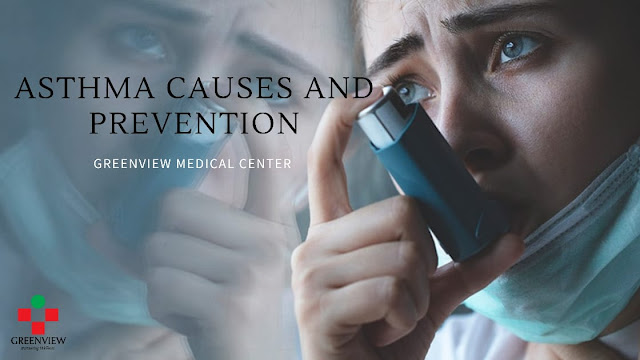Asthma Causes And Prevention
A condition in which a person's airways become inflamed, narrow and swell and produce extra mucus, which makes it difficult to breathe.
If you have asthma, you need to do what you can to cut your exposure to asthma triggers. That starts by knowing what causes you to cough, wheeze and grasp for breath. While there’s no cure, there are steps you can take to keep your asthma in control and prevent an attack.
Identify Asthma Triggers
Certain asthma triggers can set off a cascade of asthma symptoms. These include:
Air pollution
Cold air
A cold or flu virus
Exercise
Sinusitis
Smoke
Fragrances
Allergies
It’s vital to learn to identify your asthma triggers and take steps to avoid them.
Stay Away From Allergens
If you have allergies and asthma, it’s important to keep your distance from allergens (things you’re allergic to). Allergen exposure can increase the inflammation in your airways for a while, making an attack more likely.
Avoid Smoke of Any Type
Smoke and asthma are a bad mix. Limit exposure to all sources of smoke, including tobacco, incense, candles, fires, and fireworks. Don’t allow smoking in your home or car, and avoid public places that permit it. If you smoke cigarettes, get help to quit. Smoking always makes asthma worse.
Prevent Colds
Do what you can to stay well. Avoid close contact with people who have a cold or the flu, because catching it will make your asthma symptoms worse. Wash your hands well if you handle items that someone with a respiratory infection may have touched.
Consider Immunotherapy Allergy Shots
If your doctor finds that you have allergies, allergy shots (immunotherapy) may help prevent allergy symptoms and keep your asthma from getting worse. With allergy shots, the doctor injects small doses of allergens under your skin on a regular schedule. Over time, your body may get used to the allergen and respond less when you’re exposed. This can help keep your asthma under control.
Take Asthma Medications as Prescribed
Long-term asthma medications are designed to prevent symptoms and attacks. You need to take them every day, even if you don’t have symptoms. They’ll ease inflammation in your airways and keep your asthma under control, so it’s less likely to flare up. If side effects bother you, talk to your doctor about switching to another treatment.
Allergy-Proof Your Home
Whether you’re at home, work, or traveling, there are things you can do to allergy-proof your environment and lower your chances of an asthma attack. Don’t eat in restaurants that are smoky or allow cigarette smoking. Reserve a smoke-free hotel room. If you can, bring your own bedding and pillows in case the hotel only supplies feather pillows and down comforters. They can house dust mites and cause asthma symptoms.
Use a Home Peak Flow Meter
The meter shows how well air is moving through your lungs. During an attack, your airways narrow. The meter can let you know this is happening hours or days before you have any symptoms. This gives you time to take the medications listed in your treatment plan and possibly stop the attack before it starts.
Follow Your Asthma Action Plan
Take your meds, even when you feel OK. Keep an inhaler on you. If you notice symptoms, check your plan for instructions on what medications to take. During an attack, the plan can tell you what meds will help and when it’s time to call the doctor.




Comments
Post a Comment